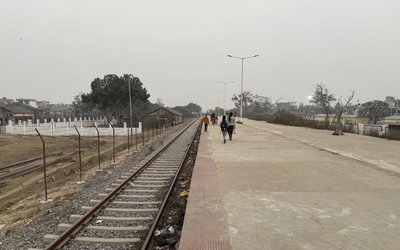It is an era of globalization, modernization, industrialization, communication and advanced technologies. As time and space are running out and getting compact, peoples and societies are running behind these things at different levels and paces. Nepal cannot be an exception regarding these developments. With the advancement of communications and technologies, the world has become a smaller place to live in.
Nepal has tremendous potential for development. It has the advantage of being a country between two emerging global powers and world's massively increasing economies, India and China. These countries are the major rising powers of the world and Nepal being situated between the two countries should take enormous advantages and profit from the progress in the neighborhood.
India has the second highest population of any country in the world and is the largest democracy. China, the world's largest population and one of the highest land areas, has a rapidly rising and booming economy. Both could assist Nepal in its economic development.
Nepal's major areas of economic development are hydropower and tourism. But due to high investment needed in the hydropower sector, the political instability and the absence of skilled manpower and long term vision, hydropower in Nepal at the current time is not effective and productive. Tourism could be beneficial and fruitful if the government brought proper and attractive packages and tour plans for people of different countries and if it assured tourists of political stability. If it made proper airfare deals, infrastructures, effective services for lodging and foods and private tour and tourism sectors would boom as well.
There are prospects for tourism industry in Nepal. Millions of tourists from the largest and world's most populated countries will come to Nepal if proper road transportation and other necessary services are made and proper accommodation and guidance are provided to them. Indians, as the largest Hindu population, will come to Nepal as pilgrims to see another nation which has its Hindu traditions, cultures, temples, rituals and historical linkages of gods. Currently, Hindu National Party, BJP has secured a majority of seats in Lok Sabha election and its popular leader Narendra Modi has become the Prime Minister. Modi contributed his best in the development of Gujrat in ten years as the Chief Minister. Thus having friendly and cordial relations with India will help Nepal in the development of its religious tourism.
The Chinese presence will be definitely high as the Buddha was born in Nepal and they desire to visit Lumbini and other Buddhist sites. But Nepal needs to focus on making international airports soon in Bhairahawa as our only International airport has become small and congested.
If we observe the international arena, the relations of US and China, which were bitter until a few years back, have significantly improved because both the countries benefit on trade and economy. China provides manpower and products to US and other foreign countries at a very low cost and its economy is rapidly rising. If US has to manufacture and produce these materials, the cost would be high, but thanks to China, the manpower and production costs have been less. China, on the other hand, has been able to give employment opportunities to its large population and export its products at low cost for higher return that boosts its economy. Thus it is a "win-win" situation for both the US and China. With the outsourcing of jobs from the US to India, the big multinational companies of USA have been helping India in customer services, Information technologies and computer related jobs. They have set up many big companies and Indian educated manpower has been getting benefit with income and overall Indian economy.
In Nepal, the political leadership has only been engaged in political matters, but it is high time and opportunity for the leaders to think about and give emphasis to international trade, relations and economy. Nepal should adopt open market and liberal policies in its economic and foreign affairs. As three aspects and terms are important in international relations, Neo- Liberalism, Neo-Realism (which are advanced forms of Liberalism and Realism) and Constructivism, Nepal's foreign and economic policies should be evaluated and implemented on those perspectives.
Nepal's current political leadership, planners and policymakers, foreign relations experts and economists should think in terms of a broad liberal, global and international perspective in this rapidly advancing world. Multinational companies of the US, European countries and other developed countries could establish their branches in Nepal to train and recruit the young manpower, providing the youth employment opportunities. The companies can utilize their knowledge and skill in generating income and exporting the goods to the outside market. They can work closely with Nepal's giant neighbors, China and India, thereby helping Nepal see its economy prosper and advance towards the next stage of development. Nepal should work towards boosting its tourism industry with the help of these nations. Most important and essential things in Nepal required at this moment are political stability, effective economic plans and foreign policy.

Nishesh Dhungana
Dhungana is associated with Kathmandu University.
- TRAVELING KARNALI UPTO RARA LAKE, MUGU
- Apr 04, 2024
- Nepal: Promoting Domestic Internal Tourism For Economic Development And Prosperity
- Jan 26, 2024
- New President: National Political Consensus For A Common Senior Person
- Feb 20, 2023
- November Election: Role Of Youth In The Political Parties And Electoral Corruption Control
- Nov 13, 2022
- Nepal Judiciary, Courts and Lawyers
- Aug 16, 2022














